#black radicalism
Video
Rep. Pamela Stevenson refuting the argument that Christianity supports transphobic bills.
#Rep Pamela Stevenson#care is the sweetest touch#Black radicalism#ableism#racism#antiblackness as the foundation of the world#transphobia#transmisogyny#racialized transmisogyny#transmisogynoir#racialized ableism#hegemonic violence#whiteness as a damaging fiction
257 notes
·
View notes
Text
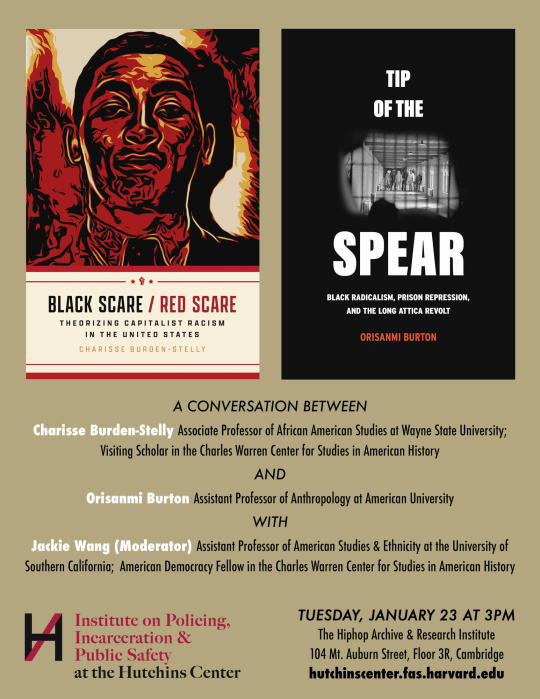
Moderating a conversation at Harvard with the authors of two of my most anticipated books of the year: Charisse Burden-Stelly's Black Scare / Red Scare and Orisanmi Burton's The Tip of the Spear.
Jan 23, 3pm at the Hiphop Archive. More info here:
https://hutchinscenter.fas.harvard.edu/event/conversation-burden-stelly-burton?delta=0
#communism#carceral studies#event#events#abolition#Orisanmi Burton#charisse burden-stelly#black communists#attica revolt#black radicalism#attica uprising#prisons
9 notes
·
View notes
Text
Anarchist Book Club Presents a reading for March:
Anarkata - A Statement
Afrofuturist Abolitionists of the Americas
Table of Contents:
What Is Anarkata?
Anarkata Tradition
Anarkata Politics
Anarkata Praxis
To What End? The End of the World?
Full text:
What Is Anarkata?
“Anarkata” emerges as a response to the political alienation that has been experienced by Black anarcho adjacent leftists who reject both the whiteness of traditional anarchism and the authoritarianism of some forms of Black nationalism.
21st century “Black Anarchism” as a concept has recently gained more popularity as the works of Lucy Parsons, Lorenzo Kom’boa Ervin, and Kuwasi Balagoon, have become more widely disseminated on the internet (and especially with the publication of the ‘Black Anarchism Reader’). This increased attention and visibility has provided a degree of validation to those of us who are Black radicals that share a common belief in the need for decolonization and self-determination for Afrika and the Diaspora, but who reject an uncritical investment in hierarchy, centralization, and the State as the ways to achieve international Black liberation.
We find Black Anarchism as a political tendency particularly attractive because of its flexibility— how it draws from a number of revolutionary frameworks—Black Marxism, Maoism, Pan Afrikanism, Black feminism, Queer liberation—which makes it not just opposed to the Western and capitalist forces oppressing Black people, but also the transmisic, heterosexist, misogynistic, disablist, and human-centered forces working against us as well. Most of us in “anarchic” Black radical movements, however, find ourselves overlooked, and our politics get confused and dismissed as synonymous with classical, European Anarchism—which is itself often misunderstood by the non-anarchic world as largely an aesthetic and utopian movement, perhaps where people in bandannas smash windows or advocate an individualist liberty, a naive pacifism, or simply uncoordinated destruction and “chaos.” It is within this milieu—of the increased popularity and relevance of anarchism to Black revolution, and the confusing or elusive nature of this relevance in the public consciousness due to anarchist mythology—that some of us decided we should develop our own name, to help demonstrate that we locate our anarchic radicalism in our own history as Afrikan/Black people.
The struggle for Black self-determination has often articulated itself through self-naming, whether naming independent parties or religious institutions or choosing non-Anglo/non-European names. Inspired by that tradition of self-naming, it was suggested we could use the term ‘Anarkata,’ to describe ourselves for ourselves within the revolutionary canon. Short for ‘anarchic akata,’ the term is to be a reclamation of the Yoruba word for ‘housecat’ or ‘wild animal’ (we thank Black Youth Project for getting us thinking about this) that has been used to describe Afrikans displaced in Amerikkka. Reclaiming a term that has been on some accounts regarded as a slur and on other accounts is said to be a way to conflate all Black/Afrikan folk with the Black Panther Party was important here. Anarkata means for us that first and foremost the prefix “anarch-“ (meaning ‘without unjust hierarchy’ or ‘without rulers’) would be grounded in the political struggle of ‘Blackness’ as a Pan-Afrikan (and Afrikan Diasporic) set of experiences and revolutionary histories (anarch-akata) and not just in some universalized, unspecified vision about absence of rule (anarch-ist). We would thus be defining domination, subjugation, exploitation and resistance to them in light of Black/Afrikan thought and struggle.
In this way, to be Anarkata is akin to something Ashanti Alston once said, where our Blackness is “…not so much as an ethnic category but… an oppositional force or touchstone for looking at situations differently. Black culture has always been oppositional and is all about finding ways to creatively resist oppression. So, when I speak of a Black anarchism, it is not so tied to the color of my skin but who I am as a person, as someone who can resist, who can see differently when I am stuck, and thus live differently.” Anarkata politics seek to consolidate that flexible culture of Black oppositionalism into a consciously revolutionary, ethical and logical form—especially in response to 21st century problems facing Black/Afrikan people globally such as climate change, environmental racism and disablement, neocolonialism, neofascism, Zionism, settler colonialism, militarized policing, mass incarceration, etc. It is this process of synthesis, a synthesis of Black radical oppositionalities along the lines of a Black nonhierarchical critique (Anarkata synthesis), that is characteristic of the Anarkata approach to Black liberation.
The following document is not to be a founding document for one particular organization but is intended to be a jumping off point for anarchic Black radicals to cohere our diverse thoughts together. The authors have not written this to speak for all things in anarchic Black revolution, but we write this as an invitation to us all to put our heads and minds together. We hope that from this document a set of conversations and relationships can spring by which Anarkatas can then more effectively propagandize and produce a wave of literature that reflects even more of our perspectives. We envision that what’s proffered here get taken up, dissected, rewritten, expanded upon, and challenged beyond here—that this be a living document. We hope that it is used to better inform and enrich the local Black anarchist work already taking place. Zines, videos, memes, lexicons, podcasts, articles— we hope to see all of this and more generated around this document so that the growing energy for and interest in anarchic Black radical politics can be intensified and pushed further. Our hope is that in coming together as Anarkatas we can then work more cohesively to make our traditions, politics, praxes, and freedom visions accessible to everyone.
42 notes
·
View notes
Text
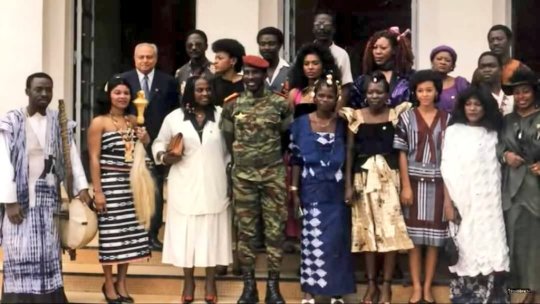
Thomas Sankara with Tshala Muana (D.R. Congo), Miriam Makeba (South Africa), Nayanka Bell (Ivory Coast), Nahawa Doumbia (Mali) and other African artists in Burkina Faso 1986.
#African Revolutionary history#African artists#Thomas Sankara#Tshala Muana#Miriam Makeba#Nahawa Doumbia#Nayanka Bell#African women in art#Rest in Power#Black Radicalism
54 notes
·
View notes
Text
Cedric Robinson challenged us to think about the role of Black radical theorists and activists in shaping social and cultural histories that inspire us to link our ideas and our political practices to deep critiques of racial capitalism. I am glad that he lived long enough to get a sense of how younger generations of scholars and activists have begun to take up his notion of a Black Radical Tradition. In Black Marxism, he developed an important genealogy that pivoted around the work of C. L. R. James, W. E. B. Du Bois, and Richard Wright. If one looks at his work as a whole, including Black Movements in America and e Anthropology of Marxism, as H. L. T. Quan has pointed out, we cannot fail to apprehend how central women have been to the forging of a Black Radical Tradition. Quan writes that when asked about why there is such an enormous focus on the role of women and resistance in his body of work, Robinson replies, “Why not? All resistance, in effect, manifests in gender, manifests as gender. Gender is indeed both a language of oppression [and] a language of resistance.”
Angela Davis in an interview by Gaye Theresa Johnson and Alex Lubin in Verso Books Blog. Angela Davis: An Interview on the Futures of Black Radicalism
"The concept associated with Black Marxism that I find most productive and most potentially transformative is the concept of racial capitalism…. Global capitalism cannot be adequately comprehended if the racial dimension of capitalism is ignored."
Futures of Black Radicalism. Edited by Gaye Theresa Johnson and Alex Lubin
16 notes
·
View notes
Text
“Restorative Vengeance” EP by Indigaux the Fae
Hey it’s Indigaux the Fae 🌈 🦋✨
I just released this very BLACK very QUEER very RADICAL breakcore EP called “𝐑𝐞𝐬𝐭𝐨𝐫𝐚𝐭𝐢𝐯𝐞 𝐕𝐞𝐧𝐠𝐞𝐚𝐧𝐜𝐞" ~ spin it on SoundCloud and comment what you think. It’s 100% written and produced by me, including all the beats. Fans of hardcore rappers like LustSickPuppy, Deli Girls, and GHOSH will enjoy.
✨🌈👾💕🧚🏽♂️✨🌈👾💕🧚🏽♂️✨🌈👾💕🧚🏽♂️✨🌈👾💕🧚🏽♂️✨🌈👾💕🧚🏽♂️
https://on.soundcloud.com/ERiX4D4AGem6yzEj8


#digicore#breakcore#hardcorerapper#bubblegrunge#nonbinaryrapper#queerrapper#connecticutmusic#undergroundmusic#noisemusic'#undergroundrapper#lustsickpuppy#ghosh#deligirls#machinegirl#soundcloud#black radicalism#experimental music#anarchist music#socialist music#anarchoqueer#anarcho socialism#socialism#anti capitalism#indigaux the fae#tiktok#instagram#discord
19 notes
·
View notes
Text
“According to Adam Smith, the discovery of America and the Cape route to India are ‘the two greatest and most important events recorded in the history of mankind.’ The importance of the discovery of lay not in the precious metals it provided but in the new and inexhaustible market it afforded for European commodities. One of its principle affects was to ‘raise the mercantile system to a degree of splendor and glory wish you could never otherwise have attained to.’”
Eric Williams - Capitalism and Slavery, 47 (1944, 1994)
#Eric Williams#capitalism and slavery#socialism#Marxism#black radicalism#black politics#chattel slavery#black history#afropessimism
23 notes
·
View notes
Text
This interview with Orisanmi Burton about what he calls "The Long Attica Revolt" is really good. Can share a .pdf if you like (dm)
1 note
·
View note
Text
W.E.B. Du Bois was the other face of Black leadership and the founding father of Black history as we know it:
It is hard to overestimate his contributions to Black history as a discipline. In his historical and cultural endeavors he was the person who formally created it, and found means to both sift it and to present it as the subversive counter-narrative to the City on the Hill it is. Du Bois objected to the views of Booker T. Washington as much as it is possible to object to an idea.
Du Bois also shows the same limits as Kwame Ture, in that he endorsed in the end not simply communism in the sense that so many people in the Long Civil Rights Movement did when it was the main organization willing to give time and money and blood to challenge racism. He openly endorsed Stalinism and objected to Khrushchev's Secret Speech, and illustrated that his radicalism, like that of Ture, had sharp limits and that in certain contexts he was entirely fine with everything he spent his earlier life claiming he opposed.
In the course of this shift he would be one of those who went back to Africa, living in Ghana and dying there in 1963. Du Bois shows both the track of radicalism and places where it could go when it took paths of consistency within specific channels.
For Black history his contributions are not just in creating it, he wrote some of the most classic prose illustrating the realities of what it is to live while Black in the United States.
#lightdancer comments on history#black history month#w. e. b. du bois#black resistance#black radicalism#long civil rights movement and the cold war
0 notes
Text
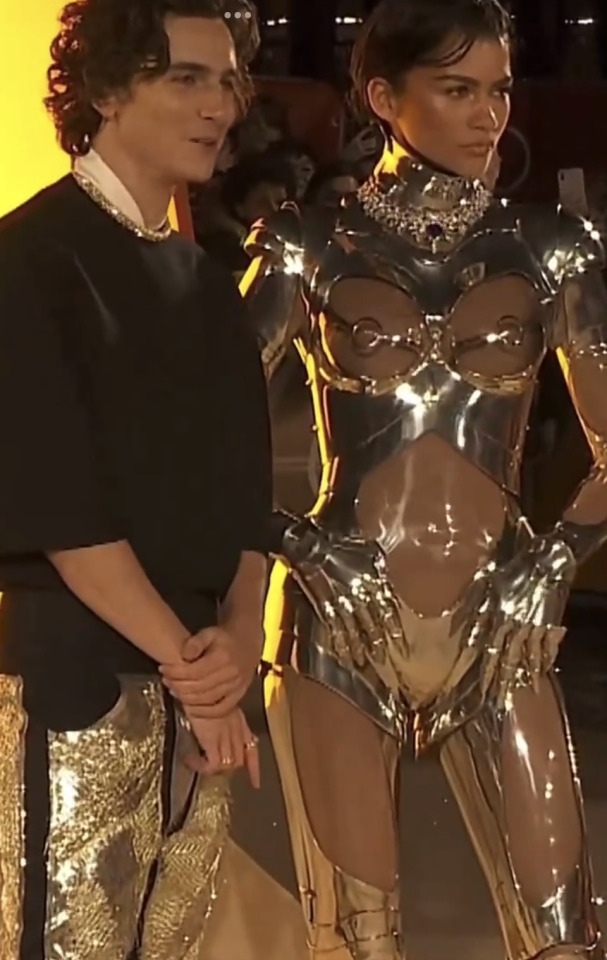

World renowned actress vs. her male co-star.
#radblr#radfem safe#radfems please touch#radical feminism#black radfems#radical feminists do interact#radical feminist safe#radical feminists please touch#radical feminists do touch#She literally has on a robot sex doll costume (designed by a man unsurprisingly) and he’s chilling in a sweater#She couldn’t even walk she had to change into a dress after#she literally could barley move or stand up straight#But Hollywood will tell you this is empowering somehow
1K notes
·
View notes
Text



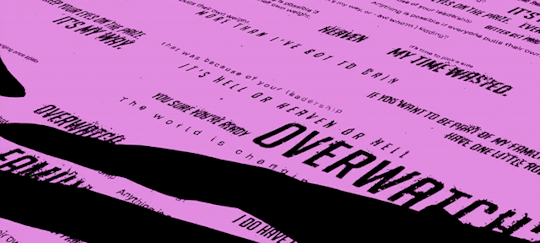

See You Space Cowboy
#cowboy bebop#cowboybebopedit#overwatch#owerwatchedit#space cowboy#spike spiegel#Faye Valentine#radical edward#jet black#ein#gif#gif edit#videogameedit#gamingedit
643 notes
·
View notes
Quote
What we come to realize is that the human as a category is not the antidote to the violence of the slave’s existence as property, or the fungibility of black life, but a way of extending and codifying what may and may not be done to property, what the enslaved may and may not do or feel. Are there limits to what may be done to person and body within the scope of the law? Can you take a life for insolence? Is mayhem reasonable and justifiable? Is torture within the purview of possession? Is rape a crime when the violated are black women? Plainly put, the distribution of violence and death and the recognition of human capacity are inextricably linked. This selective recognition is also essential in establishing the hierarchy of the human, less as a stark division characterized by those who are included and excluded from the category, than in creating a taxonomy of the human which serves to justify the uses to be made of life, the forms of socially necessary violence, the extraction of capacity and the distribution of death. All in the name of recognition.
from Saidiya Hartman’s conversation with Zakkiyah Iman Jackson
#Saidiya Hartman#Zakiyyah Iman Jackson#Black radicalism#the terrible terror of social death#antiblackness as the foundation of the world#the gnarled roots of the hold
175 notes
·
View notes
Text

3, 2, 1, Let's Go!
Tank! By Sachin Teng for the Cowboy Bebop 25th Anniversary Art Exhibition
#Cowboy Bebop 25th Anniversary Art Exhibition#cowboy bebop#spike spiegel#Jet Black#faye valentine#Radical Edward#Edward Wong Hau Pepelu Tivrusky IV#Ein#art
3K notes
·
View notes
Text

Somebody needs to draw Hobie Brown in this shirt has anyone drawn him in this shirt Hobie needs this shirt cause this is a shirt he would absolutely wear
#he has the humor#Hobie is none of those things#he is a black queer radical genderfuck#SAW THIS ON A MOOTS BLOG#spiderman#atsv#spider man#marvel#across the spiderverse#hobie brown#spider punk#spiderpunk
417 notes
·
View notes
Text

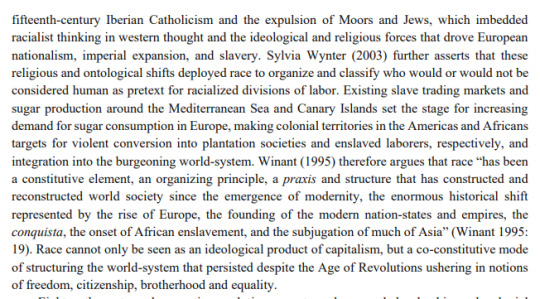
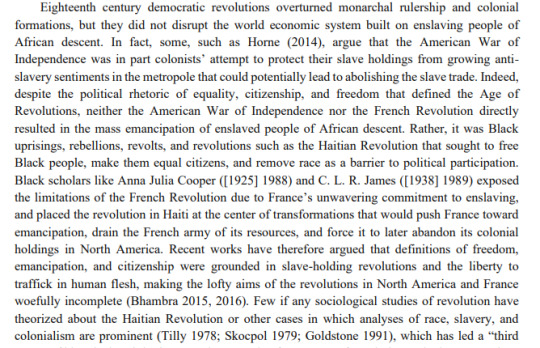

#Black Revolutionary History#Ayiti#Haitian Revolution#Black writers#Cedric Robinson#Black Radicalism
2 notes
·
View notes
Text

it was Ed's idea
488 notes
·
View notes